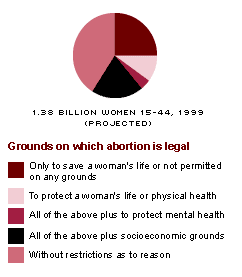The parliament of Nepal voted overwhelmingly in March to legalize abortion in that country up to 12 weeks of pregnancy and as late as 18 weeks in cases of rape or incest. The Nepali action continues the worldwide trend toward liberalization of countries' abortion laws. Other than Poland, which reversed its long-standing policy in 1997 and outlawed abortion in most circumstances, no country has restricted its abortion law in any significant way in many years. Currently, more than six in 10 of the world's women live in countries where abortion is legal under most circumstances (see chart). This includes more than half of women in developing countries and almost nine in 10 women in developed countries.
The new law is a radical departure from past policy: Abortion had been banned completely for any reason in Nepal, and having an illegal abortion was a criminal act. Indeed, the first test of the government's commitment to the new law will be its decision whether or not to free the some 65 women who are currently imprisoned in Nepal for that very reason. The law does not address their plight, but legal and political efforts are underway on behalf of these women and their children, who in some cases live in prison with them.
Nepal has one of the highest maternal mortality rates in the world, and it is estimated that half of those deaths result from illegal abortion. Indigenous nongovernmental organizations (NGOs) pushed for abortion law reform in part as a public health imperative. It is also significant, however, that the new abortion law is paired with provisions that for the first time, ban child marriage and polygamy and grant Nepali women some measure of property rights as well. Accordingly, the broad coalition of Nepali NGOs and government officials who for the past seven years campaigned for these changes view the entire package as a major advance for women's and human rights.
Other Actions
In a related development, a referendum will be conducted in Switzerland in June, in which the government will submit to the Swiss public its recommendation that abortion be legalized through the first 12 weeks of pregnancy. Referendum voters will have the option of supporting an alternative ballot measure, sponsored by antiabortion groups, that would ban abortion altogether. Dating from 1942, Switzerland's existing law deems abortion a criminal offense except when necessary to preserve a woman's health. Expectations are that the government's position, which closely reflects longtime abortion practice in Switzerland, will prevail.
Finally, on another note, Irish voters by a razor-thin margin rejected a government-backed referendum in March that would have narrowed Ireland's already highly restrictive abortion law even further. Abortion is banned entirely in Ireland except when continuing a pregnancy would endanger the woman's life. The government and the Catholic hierarchy had wanted to close a "loophole" in the law under which the threat of suicide is considered a life-endangering situation. In a 1992 ruling in a case that involved a 14-year-old who sought an abortion after being raped by a family friend, the Irish Supreme Court held that the law's life-endangerment provision did, indeed, encompass suicide threats. Ireland's voters in the referendum turned back the government's attempt to tighten the law with 50.4% of the vote.
—S. Cohen
| Abortion Law Worldwide |
| Nepali women join a majority around the world living in countries where abortion is legal under most circumstances. |
 |
|
Source: The Alan Guttmacher Institute (AGI), Sharing Responsibility: Women, Society and Abortion Worldwide, New York: AGI, 1999, page 21. |
